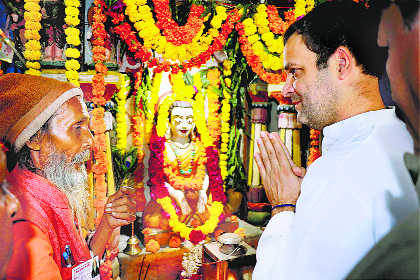
PTI file
Saba Naqvi
The Ahmedabad-based taxi driver had been with me for two days, helpful and pleasant, as we toured Gujarat for the ongoing elections. On our way back from Viramgam, I told him, “We will be entering through Juhapura (India's largest Muslim ghetto) and could we please stop.” I got a blunt answer: No one should stop there; that is Pakistan; all filth of Gujarat comes from Juhapura; I will not stop there.
I've confronted communalism of various forms but this was more profoundly troubling as it was just a matter of fact statement. My driver did not intend to be vicious; he was revealing the manner in which he and many other Gujaratis see Muslims. Intellectually, what was interesting for me was to understand the notion of "fear" of the Muslim although 15 years ago, it was the minority that was viciously brutalised in the state.
Take Juhapura, before 2002 just another Muslim neighbourhood in Ahmedabad with a population of 40,000. After the riots, Muslims from across the city and the state came there seeking sanctuary and today the population is 5,00,000.
This expanding population is served by just two primary schools run by the government and one secondary school. But the good news is that where the state has abdicated, the community has, via various trusts and private initiatives, responded by setting up its own schools — not madarsas — and close to 30 primary and secondary schools have come up in Juhapura.
There Gujarat's second-class citizens live without adequate streetlights, parks, pucca roads, separated from Hindu neighbourhoods with ditches and barbed wires. Yet as human beings do, they persevere with their lives and possibly the strong tradition of entrepreneurship among a section of the Gujarati Muslim has just made this ghetto a universe unto itself. Muslim enclaves in Uttar Pradesh could learn some lesson from the sheer survival skills of their Gujarati brethren.
This is not the first time I've travelled in Gujarat and it's the only part of India where it's become par for the course for me to avoid revealing my name when traveling outside Ahmedabad. I don't feel victimised by having to invisibilise myself; I just do it to get people to open up more frankly. That is why I quite understand the need of the minorities of Gujarat who want to invisibilise themselves during the election campaign.
Take Rahul Gandhi's energetic campaign in the Modi bastion, in the course of which he has visited many temples. There is no appeal being made to him to balance that with visits to distinctly "Muslim" locales. On the contrary, appeals have been made to him to avoid doing just that by members of the minority community.
It must also be said that Juhapura is not representative of all Gujarat’s Muslims although it is certainly representative of Ahmedabad, where some of the most brutal violence took place in 2002. I was also pleasantly surprised to land up in the midst of a panchayat meeting in a village in Mehsana district, dominated by Patels, but where there were two Muslim members. Gujarati speaking, they were transporters and not afraid to voice their views in front of the others who were supporting the BJP.
Communalism is so open in Gujarat that the sarpanch just said to their faces that “Muhommadans” always think differently. Such barbs were traded quite amicably. It was a riotous and raucous meeting, but a riot did not seem to be in the offing.
And so I moved on perversely relieved that at least the great election narrative in Gujarat was refreshing in one respect: one was not fed reams of stories from reporters obsessed with cracking the mysteries of the Muslim vote and then getting it spectacularly wrong.
This is partly because the demographics of Gujarat are different from the two big heartland states, where the minority community makes up nearly 20 per cent of the electorate (as do Dalits). In Gujarat, Muslims are 10 per cent and Dalits 7 per cent. Second, there is no multiplicity of regional parties from which the minorities can choose in Gujarat and the only alternative to the BJP is the Congress.
What is visible in such stark relief in Gujarat should also be seen beyond the BJP and Modi, it is also linked to global processes across the world where Muslims have become a feared community. If one really examines the facts, one may see the tragedy of wars in lands whose inhabitants are followers of Islam. The developed West keeps expressing the fear of the Muslim, but no guilt for destroying many of their homelands.
Similarly, there is no guilt in Gujarat about the 2002 events and Muslims continue to be viewed as suspicious, filthy, dangerous or all of the above. They are not allowed to work in many buildings in Ahmedabad and a city editor explains to me that it's sound Gujarati business-sense to recognise that if Muslims move into any area, property prices would go down.



























